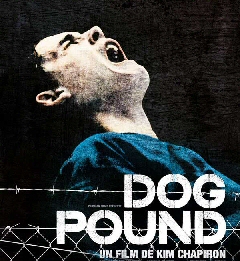
There are a few movies so iconic and powerful that any idea of them being remade seems like utter madness. Take Alan Clarke's notorious Scum, for example. This story of the brutal struggles between inmates and officers in the Borstal system was enormously controversial for its time and, in many ways, still is. Born from a prototype BBC drama they deemed so shocking it was shelved for decades and, until recently, pruned by the BBFC, the movie has gone on to be one of the most quoted and, in its own way, influential British films of the '70s. It's a film burned into the minds of many of us, and any director who even contemplates a remake... well, the little scrote needs a visit from The Daddy.
Director Kim Chapiron isn't afraid to take on the big boys. His previous (and first full length) movie, Sheitan, showed he wasn't afraid to shy away from the controversial, the dangerous or deal with society's outsiders. Sheitan was so warped and surreal that it raised concerns that he'd push things too far and end up with some sort of borstal pantomime. Luckily for everyone, Dog Pound couldn't be more different to debut feature.
If you've seen Scum, you don't need me to tell you what Dog Pound is about. While not a scene for scene remake, key events and story progression frequently echo each other. Here we follow three young inmates of the Enola Vale facility for juvenile offenders, all incarcerated for different reasons and all with varying degrees of experience in the justice system. Davis and Angel are new and wide-eyed, both under seventeen and forced to learn the rules of the system fast. More knowledgeable is Butch, moved to this facility after a violent assault on an officer. Butch is older, wiser to the system, but carries within him a violent anger that is much more complex than it first appears.
Cleverly, Chapiron hasn't attempted to recreate Scum but uses it as a series of hooks to hang an updated statement upon. What is both fascinating and worrying to note is that many of Scum's salient points and the central message of a broken system are as applicable today as they were thirty years ago. While many remakes are redundant, Dog Pound pleads, and proves, its case by bringing a new sense of maturity and compassion not present in the original.
I know that some people are going to think what I'm about to say is blasphemy, but hear me out. Dog Pound is a better film than Scum on almost every level. I watched the two films back to back to make sure, so surprised was I by my suspicions. That's not to belittle Scum, but it's a film very much of its time. It's also a film that's been ruined, to some extent, by spawning a whole generation of Danny Dyer style mockney well-'ard hooligan romps. Watching Scum today, straight after watching Dog Pound, feels like watching an episode of Grange Hill with swearing and bum rape. To today's eyes, the film is full of unrealistic caricatures; everyone is so hard and callous, from the vicious guards plotting against those in their care, to the sociopathic inmates constantly trying to outdo each other in their attempts to flick Vs at society. Sure, it's a great watch, but the years (and films like Green Street et al) have stripped much of its power, leaving Scum a nostalgic piece of entertainment rather than hard hitting social commentary.
What Dog Pound does so well is spend time giving personality and motivation to all the central characters. When confronted with what are clearly ordinary kids who've made some bad life choices, it's not hard to feel empathy for them when confronted by institutionalised problems. There's a large amount of warmth and humour in many scenes as the kids discuss their lives, dreams and fantasies. Especially interesting is the portrayal of Officer Goodyear, played with great subtlety by Lawrence Bayne. Here is a guard desperate to see the inmates use the time to better themselves, gently but firmly prodding them towards opportunities that will give them a better chance once outside the prison walls. Through his "harsh but fair" attitude you get the sense he really cares for those he watches over and his understated performance at the discovery of the tragic fate of an inmate is exceptionally powerful. Also fantastic is Adam Butcher as Butch, at first seeming volatile and unpredictable until you realise that his is a righteous anger, fuming at injustice against those who cannot protect themselves. Unlike Winstone's character in Scum, he doesn't seek to take over the hierarchy; he just refuses to allow the downtrodden to be stamped upon.
Dog Pound is a powerful and intelligent film. A roar of compassion with vibrant performances from a young cast that feels honest, raw and fresh. It becomes painful to watch as a shocking mistake derails the chance of redemption and sets the institute on a self-destructive course that nobody is able to regain control of right up until the complex and explosive conclusion that ends with a sudden closure of any and all hope. This is an outstanding achievement and one of the most interesting films I've seen all year.
Review by Paul Bird
| Directed by Kim Chapiron |